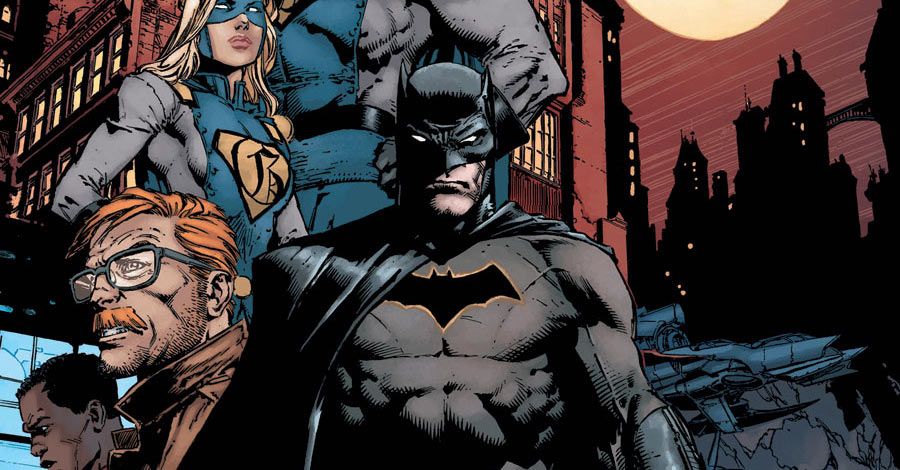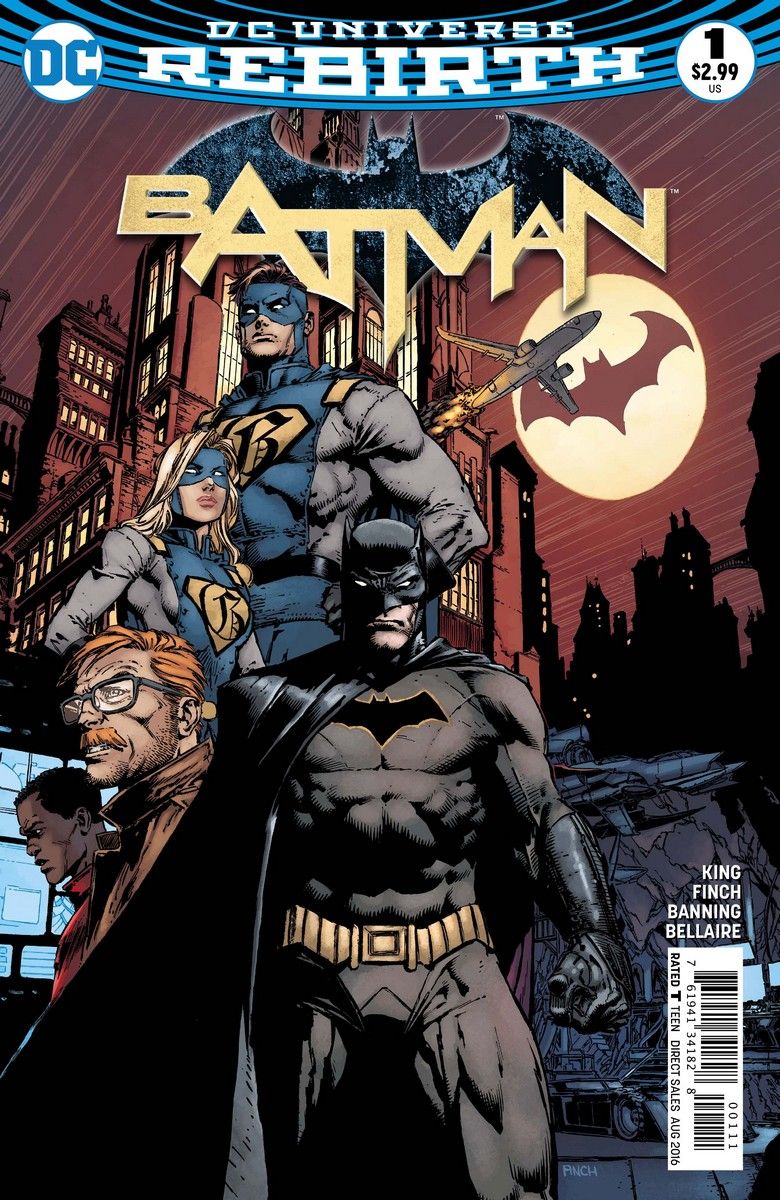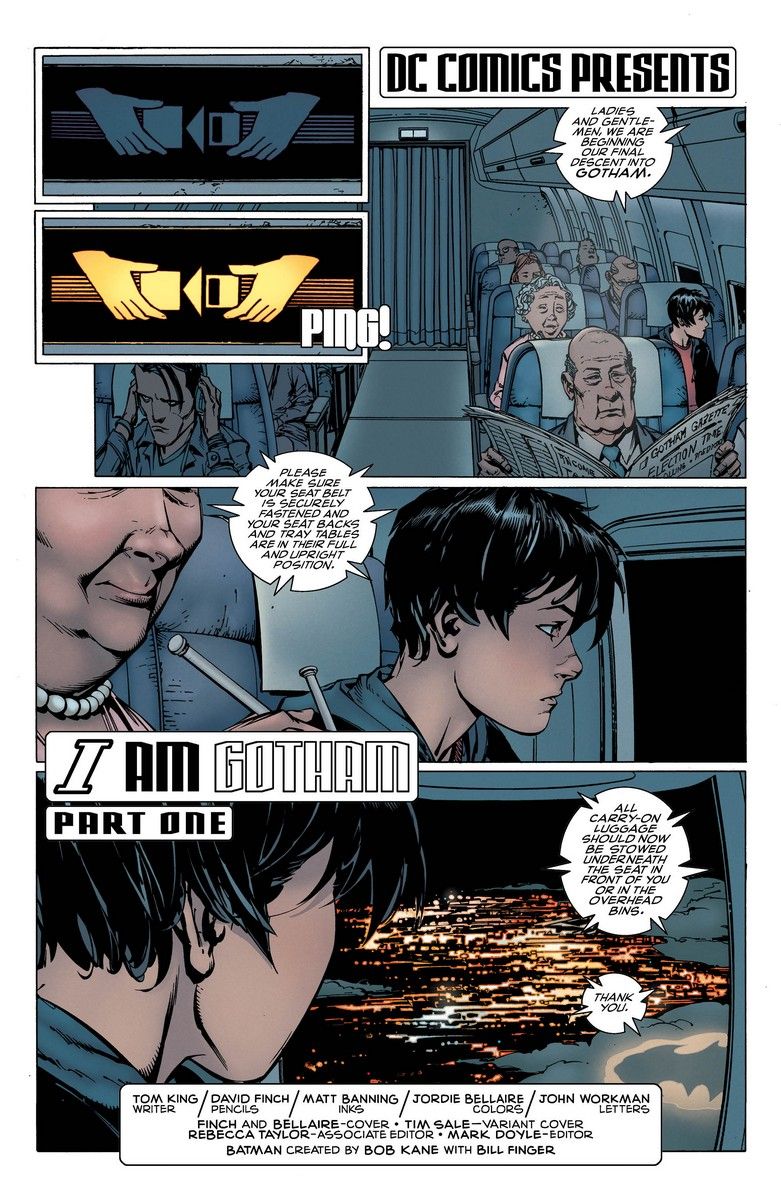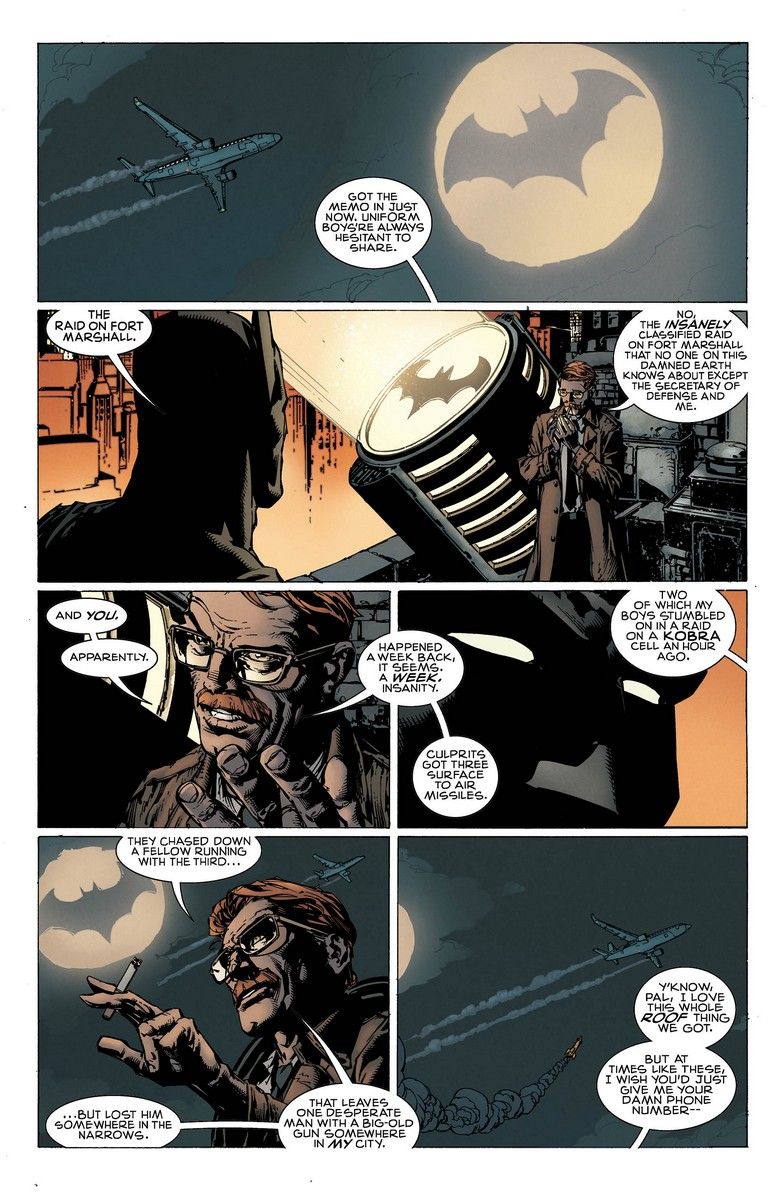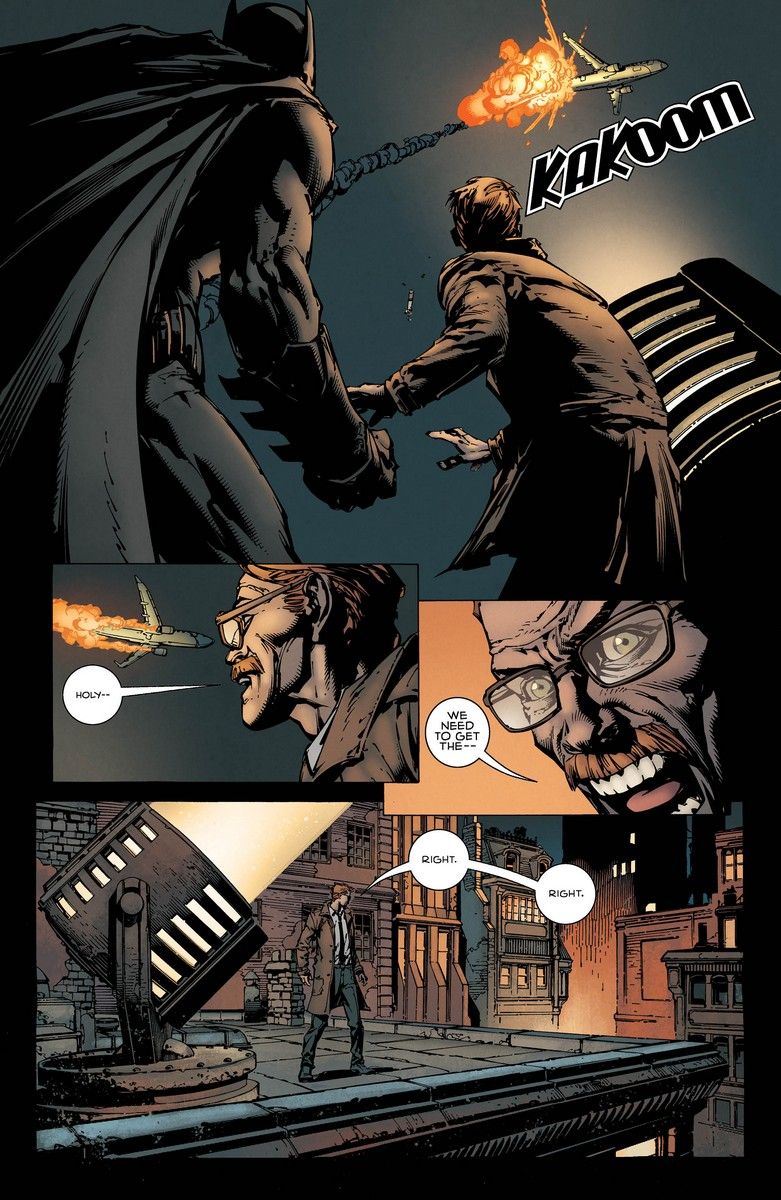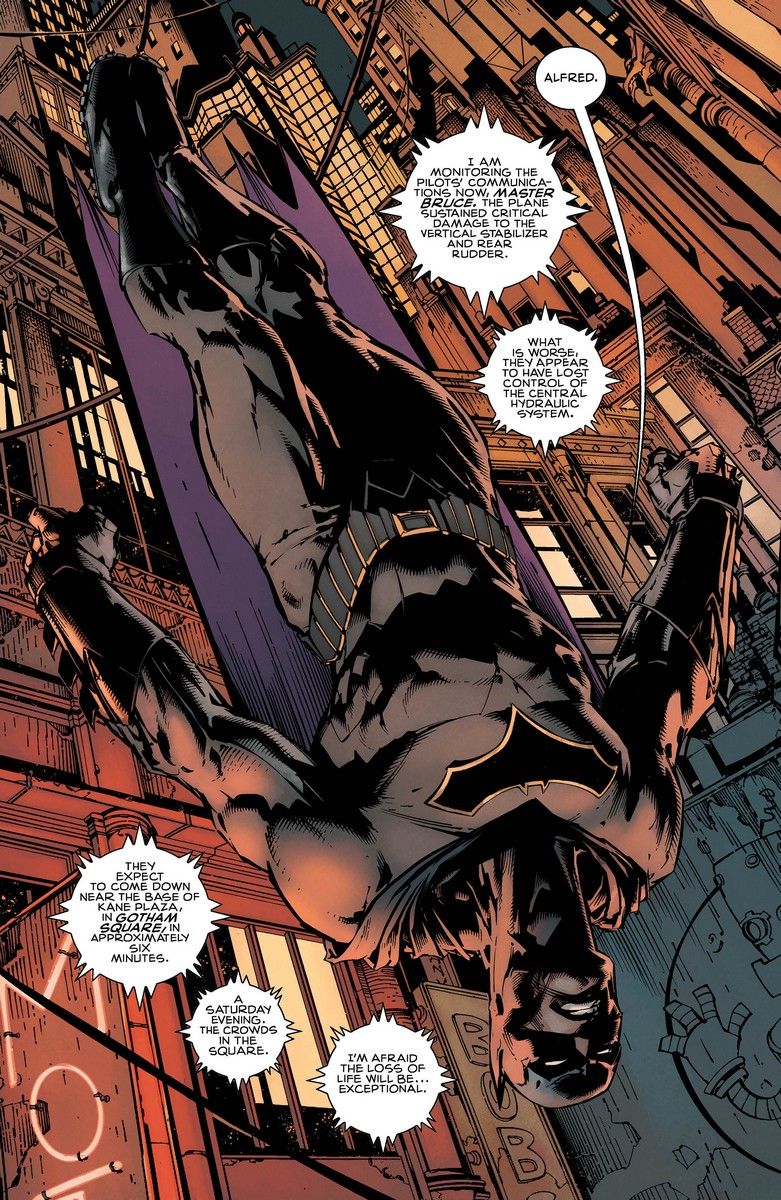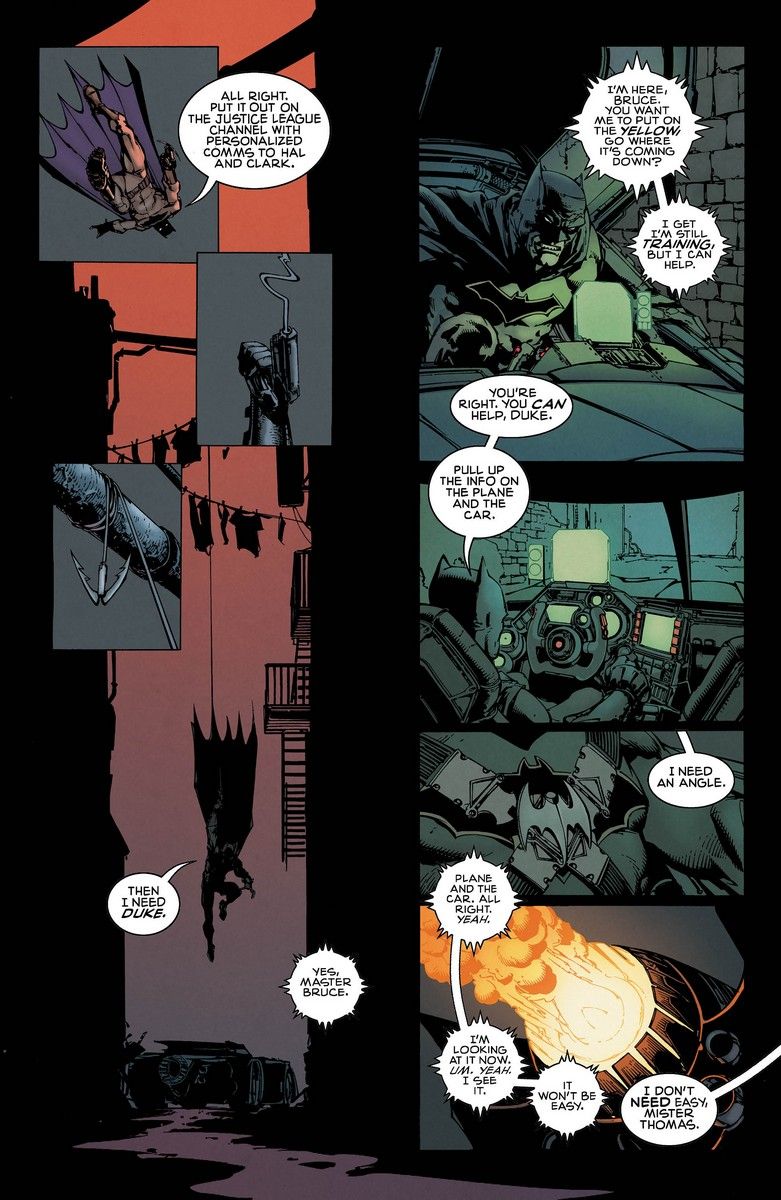SPOILER WARNING: This article contains major spoilers for "Batman" #1, on sale now.
A relative newcomer to the comics game, writer Tom King killed it for DC Comics' New 52 with critically acclaimed runs on "Grayson" and "The Omega Men." The reward? King earned himself an exclusive contract with the powerhouse publisher and more significantly, the keys to the Batmobile.
As part of DC's Rebirth relaunch, King is joined by superstar artist David Finch on the now bi-weekly "Batman," taking over for the celebrated creative team of Scott Snyder and Greg Capullo. King told CBR News he has one job, and that's to continue the excellent run that came to a close with the end of the New 52.
RELATED: The Dark Knight Bursts into All-Out Action in Classic-Feeling "Batman" #1
Batman doesn't need fixing, according to King, and what he hopes to explore in the new series is why that's the case. How does a caped billionaire detective stand so tall next to super-powered superheroes like Superman and Wonder Woman? The former CIA operative-turned-writer has a strong understanding of what makes the Dark Knight tick and he proves it with his first issue of "Batman," a 32-page thrill ride through the streets (and skies) of Gotham. To add drama and juxtaposition to the exploration of The Bat, King's first issue, on sale now, also featured two new superheroes to the DC Universe: Gotham and Gotham Girl.
Confirming the new dynamic duo will play a major role in the series -- and across the entire DCU -- moving forward, King also shared that Duke Thomas is key player in "Batman" but for the foreseeable future, he will play sidekick from the Batcave and not riding shotgun with the Caped Crusader.
CBR News: There's an excellent exchange between Bruce Wayne and Duke Thomas in "Batman: Rebirth" #1 when the new dynamic duo is talking about combatting Calendar Man. Bruce says, "[It's] easy, we come back better each time too." This line reads very meta to me. Obviously, you don't want to jump into Gotham by comparing yourself with the great writers that came before you but is it important to reinvent or rebirth Batman as you see him for this new series?
Tom King: I don't know. Batman is the one character that didn't need to be "reborn." He didn't need fixing. Batman wasn't broken in the New 52. He wasn't broken pre-the New 52. Scott [Snyder] wrote him as good as you can write him. I think my job is just to not screw up what Scott did. [Laughs] I just need to build on that. And in doing that, I have to bring myself to it because the only weapon that I bring to the table -- my experiences, my thoughts on the character, what he meant to me growing up and what he means to me now. It's not a matter of a rebirth but rather it's continuing the excellence of the series.
What did Batman mean to you growing up?
I was a fat kid. I was a nerd. I read comics when comics were definitely not cool so I got bullied like nothing else. I remember when I was a kid in movies, bullies were the bad guys but at my school, the bullies were the cool kids and everybody was rooting for them. And they were rooting against me. And that's why I gravitated toward Batman. He was the guy that if the bullies hit you, he'd hit them back. He was the guy on the other side of that fist.
And what does Batman mean to you now in terms of the importance of a superhero without superpowers?
I think that's the core of what makes Batman fascinating. It's all about his mortality. He's any of us. He's all of us. He has that will. Any of us could be Batman if we just had his will; if we just had his determination. And the fact that he's Batman, the fact that he turned what we have into that is psychotic and inspiring. That's Batman in a nutshell. He's psychotic and inspiring at the same time. And that contradiction is why everyone keeps writing him and writing him well. He's clearly the good guy but there is also something about him that's just not right. And that's cool.
And does Bruce Wayne mean the same thing? Meaning, do you see and write Batman and Bruce as one in the same or are they basically two different characters?
It's funny because I think of it in two ways: When I'm inside the character's head as opposed to when I'm inside my head. [Laughs] I feel that Batman himself and Bruce Wayne himself see no difference between the two of them. I think that he sees himself as transforming when he puts on the costume or that he transforms back. His entire life is devoted to that oath that he took by candlelight after his parents died to defeating crime. He sees his work as both Bruce and Batman as going towards that oath. He has that one goal. But that's his own psychology. Looking from the outside, people might see it entirely different. And as a writer, I am allowed to be on the outside. I see the thing that everyone says, which is Bruce Wayne is the mask and Batman is the real person. I tend to agree with that but I think it's a little more complicated than that because I don't think Batman agrees with that.
I loved your first issue with David Finch. It felt very much like we were on the call with Bruce and Jim and Alfred and Duke in real-time. Is this the approach you are going to take with your storytelling in "Batman," or was this special to drive readers head-first into this new series?
"Batman" has to be the best action movie that you ever saw. It has to be "Die Hard." It has to be "Aliens." It has to be those moments in the "Fast and Furious" movies when you say, "I have never seen anything like that before." And there is something inside of you that makes you want to do it too. I have subtleties to my writing but I'm not a subtle writer. I started my run on "Batman" with a seatbelt sign going on. It's like that old Betty Davis line: "Fasten your seatbelts, it's going to be a bumpy night!" But no, it's supposed to invoke that feeling. And I like that pacing. I don't like comics that are just like essays about character. I think character comes out through action. Who Batman is comes out through what he does.
Is it difficult to write Batman's dialogue or did you find his voice easily?
Batman is an easy voice to write at least for me, especially compared to Dick Grayson. Batman always says what's necessary. He's so goal-oriented. He is there to get something done. He's not a quipper. He doesn't make silly jokes. And if he does, it's because he wants to distract you. Every word and action Batman does have a goal to it. In that sense, Batman is an easy character to dialogue. But I think that can be a trap too. You can get it stuck too dark and dank. You have to be aware of your subject and be aware that Batman is smart enough to realize that although he is driven all of the time, being driven all of the time is not productive.
"Batman: Rebirth" #1 Gives Duke Thomas a New Role, Revamps Classic Foe
What role is Duke Thomas playing in "Batman," because he's not the new Robin, right?
Very purposefully, Duke Thomas starts out the way Tim Drake started out. Tim did a year in the cave before he came out on missions. And that's going to be the same for the first year of "Batman." Duke Thomas is not front and center by his side at the beginning of this run. Basically, Batman hasn't trained him yet so he doesn't trust him in that role. That training and trust is partially what Scott is doing in "All Star Batman." Scott's telling that amazing story and once "All Star Batman" gets rolling, Duke's role will become more prevalent.
As far as his current role, I think Duke brings a ton to "Batman." I think he's a character that we haven't see in that universe, a character with more independence and more confidence but he still has this tragedy at the heart of him with his parents being Joker-ized. I love writing him because he knows what he is doing. And he gets off the ground that way.
Obviously, the big reveal in the final pages of "Batman" #1 is the arrival of Gotham and Gotham Girl. You teased that Gotham was lacking a super-powered hero with the panels and pages set on the plane featuring a passenger espousing this very message. I don't think you'll give too much away just yet -- nor do I want you to -- but what does a non-powered superhero in Gotham mean to how the city runs and operates (both good and bad) and what might super-heroics offer in terms of changing things around?
I've been very careful about talking about Gotham and Gotham Girl and what role they're going to play because every issue has a twist on where they are going to go. We have a big plan for these characters, both how it plays out here and in the DCU in general. I was so mad -- just joking, I wasn't mad but Geoff [Johns] put their first appearance in "DC Universe: Rebirth" #1. They have such a big impact, I wanted them to have their first appearance in "Batman" #1. [Laughs]
The essential question, and this is will be the question that I do throughout the whole series that I do, is "Why is Batman essential?" In a world of superheroes, how can Batman be as key to the DCU as he is? Batman can't save a city from an asteroid crashing down on you. Can he or can't he save himself from a plane crash? If you read it, you know he can save the plane but he can't save himself. He has to die at the end of "Batman" #1 if he wants to save the plane. As far as he pushes the button on his ejector seat, he knows that he is going to die. I think that question occurs to Batman and I think that is a doubt that he himself has. He's just not powerful enough to handle some of threats that face the DCU. Batman coming to terms with what gives him the power to do that and what makes him special is one of the themes at play.
I have to say that I question it too. I think Batman's great and I know he's wildly popular but come on, in a world where Superman, Wonder Woman, Aquaman, The Flash, Green Lantern and the Martian Manhunter exist, Batman should stick to the streets of Gotham.
You're right. It's insane that Batman stands next to Superman and Wonder Woman in the Trinity. It's crazy. It's also amazing that he's willing to do it. He sacrifices himself for us in a way that Superman and Wonder Woman do not. And I want to go right at that theme.
David Finch is the artist on "Batman" and when he moved over to DC Comics a few years ago, it's because he wanted to work on Batman because he loved the character so much. What does David bring to the table as an artist and a collaborator?
David brings everything to the series. His storytelling is next to none. And when you think about his compositions, he can draw anything. And he draws better than almost anyone. I ask him to draw everything. I asked him to draw a bridge full of cars and he drew 30 cars with little people running next to the cars. The detail is crazy. He's so good. So far in my career, I've been lucky to get these up-and-coming artists who are going on to become great starts like Mikel [Janin] and Gabriel [Hernandez Walta] but David is a star and he could have gone all prima donna on me but he didn't. He said, "Let's work together. Let's find the best way to tell this story." He's great.
And he looks so great with Jordie [Bellaire] coloring him. With Jordie rendering the figures, you can see more of David's line work. He puts so many lines in his work. I think it looks great.
You're still a relatively new name in comics to be taking on one of DC's flagship books. Is there anything you would say to readers who don't know you and your work heading into "Batman"?
Yes, I wrote a short story for Vertigo that was nominated for an Eisner. John Paul Leon was the artist. And DC was nice enough to put it out for free. If people are thinking, I don't know about this guy on "Batman," you can find a free sample of my writing. It's called "Black Death in America." Type "Black Death in America and Tom King" into Google and you'll find a free version of it.
"Batman" #1 by Tom King and David Finch is available now.

